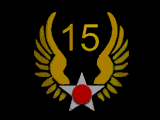|
I flew overseas as Co-Pilot with one of the greatest guys of
all time, Pilot Dalton W. Smith, who was a bull of a man, an extrovert, a mover
and shaker. We arrived in Maduria before Xmas 1943 on a mud landing strip; with
no cots or beds to sleep on, and slept in our flight suits (a supply ship had
just been blown up in Bari Harbor that had ammunition and supplies thus we had
nothing – except a drink called Grappa which kept us all quite warm and was
responsible for guys in another barrack pulling old wooden siding off their
barrack to keep warm but subsequently burned it to the ground on a freezing
Xmas night) – I was 22 years of age.
On January 18, 1944, while flying the "Banana Boat" on some
mission, somewhere, (Pisa, Italy), we were in serious trouble; down to two
engines; so stripped the plane of anything that could be pried off, and all got
into emergency landing positions. The only place available North off the German
line on the West of Italy was the Island of Corsica on which was a British
Spitfire Aircraft landing field. Smitty was able to land the B-24 on a tiny
fighter pilot air strip surrounded by a forest. We stayed several days as the
plane was pushed off the strip, and trees cut to make room for a B-24 rescue
ship which came with just two pilots (a dynamite friend of Smitty's named
Girando who I understand became a General) and we flew back to Manduria.
On February 22, 1944, prior to the most important mission of
our tour, to the Messerschmitt Assembly Plant, at Regensburg, Germany, which is
Northeast of Berlin, the commanding Colonel/General (?) let us know that no
one, but no one, was to abort this most important flight and not to return to
the field without having dropped bombs over the target. If someone was having a
heart attack, simply fulfill the mission and the subject could be discussed
later. It was a very serious lecture and nothing like it had ever been
expounded.
On take off, we could not exercise our bomb bay doors by
opening and closing them. They were locked closed and could not be opened
manually or electrically. The four officers had a meeting and elected to
proceed with the mission and drop the bombs thru the doors. On notification of
this decision the enlisted men (6) objected strenuously (in retrospect, they
were correct) but we proceeded. At bombs away, all hell seemed to break loose,
the roar of the wind deafening, the icy blast of air freezing and we dropped
like a rock. For other reasons, all four engines quit and after further
altitude loss we settled down to two engines for the long haul to the closest
point of land south of the German lines. I don't know how many hours we flew
with one door of the bomb bay flailing as we proceeded flying at about 200 to
500 feet above the Adriatic at a heading that the British had given us by
radio. We raised our altitude to 500 or 800 feet (?) as we passed one foot over
land and started bailing out. I dove out, and Smitty, who was behind me,
stepped on the steel walk to jump as the 3rd engine quit – he fell
hitting his back on the beam and then fell out. Four of us landed in soft
terrain, five were sent home with injuries and one flew a mission the next day;
bailed out and ended up in a German prison camp. (Years later he asked that I
write the Air Corp substantiating his bail out as he needed physical therapy
for a serious back injury from the incident).
We were picked up by truck, and in the silence of our long
trip to the base I kept wondering where they would send us for R & R –
Capri?? The next day, February 24, 1944, I climbed in a B-24, named Liberal
Lady with Bill Cranston who was first pilot and we headed back to Regensburg,
Germany. He had been Captain of his plane to Regensburg the previous day, but
it was in no condition to fly again. I will never know if we were hit by flak,
fighter, or we had a bad engine/engines or what – but the Engineer told us we
did not have a quarter of a tank of gas left and could not make it back to
Allied territory. We had a meeting. Joe Oravec, our Navigator said he could get
us to Switzerland, though I don't think he had a map, or a decent one, as we
landed 5 to 10 miles inside Switzerland when we bailed from 10,000 feet after
we headed the ship toward the mountains on auto-pilot.
On September 3, 1944, my birthday, Joe Oravec and I left
Switzerland headed south with the French Marquis to meet the U.S. troops. We
met them. That's the story.
** Footnote**
We were the first 15th
Air Force B-24 in Switzerland. Partial crews of British and American bombers
were in Adelboden at Camp Moloney. They came from England, the 8th
Air Force. There were a total of 9 crews from England and we made the 10th
crew in Switzerland at Camp Moloney, Adelboden, Switzerland on February 25,
1944. Of the 10 crews, there were 60 men as the balance (40 men) had been killed
in the air or from bailing out, or had landed in Lake Constance or on German
soil. We landed near Schaffhausen and were 5 to 10 miles from the German
border.

Pictures of the crew who were interned in Switzerland
Submitted by the co-pilot of the Banana Boat, Frank Molina
|



